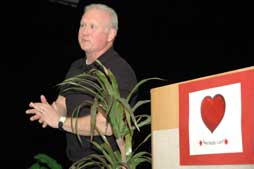By Autumn Walsh/reporter
Audience participation took an odd turn at an Ethics in Politics and Policy speech Feb. 7 when the audience, mostly middle-aged women and men, went from a discussion of ethics in medicine and law to the death of actor Heath Ledger.
Speaker Dann Baker, chaplain at John Peter Smith Hospital and ethics consultant, used a PowerPoint show and personal anecdotes to define the principles and language of ethics in law, medicine and politics.
Baker encouraged the audience to participate and voice opinions on topics like political corruption, basic laws and personal beliefs on ethics by using anecdotes to make it more personal.
Calling himself a “political junkie,” he referred often to the upcoming election and political ethics, along with religious and legal situations.
As the speech moved into one’s duty to persuade others into thinking their way, the audience became more talkative.
One woman used her frustration with Ledger’s recent death as an example of her right to “educate, not persuade” people about the dangers of prescription pills.
As a result, other audience members began to voice their opinions on the ethics surrounding the popular actor’s death.
Audience members questioned whether educating others about one’s beliefs was the same as persuading them to feel the same way since the purpose of educating is to persuade.
Others questioned who was more responsible for the death. Is it the pharmacist’s responsibility, or does it solely belong to the doctor prescribing the medicine?
Perhaps it is the patient’s own responsibility to educate themselves about the medicines they’re combining, some said.
The debate over Ledger’s death lasted almost 30 minutes before Baker was able to bring the particular discussion to a close and continue with the basics of ethics—conscience, religion, law, standards, rights and obligations, virtue and character, reasoned discussion and principles.
Small groups were formed to discuss and analyze hypothetical case studies over legal obligations versus personal ethics.
Baker encouraged groups to put themselves in the position of the case studies and decide what they would do with the conflicts of ethics and law.
As the audience voiced frustration over laws versus personal ethics, Baker asked, “Do ethics and law sometimes conflict?”
“Well, yes,” she answered herself.
























